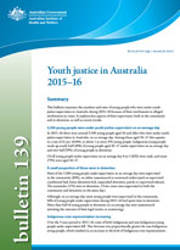Northern Territory
Youth justice systems, policies and programs
Key policy directions
The Northern Territory Government’s law and order policy, the Pillars of Justice, identifies the strategic direction for all agencies involved in both the criminal and youth justice systems. The fourth pillar, Youth Turn, is dedicated to strategic youth justice initiatives including:
- the development of the Youth Justice Framework;
- development and implementation of Early Intervention and Sentenced Youth Boot Camps;
- a review of detention centre operations; and
- the development and implementation of a community-based youth supervision model.
Central to the Government’s focus is to reduce offending and re-offending of children and young people in the Northern Territory through a comprehensive and coordinated approach to program and service delivery by both government and non-government providers.
Key agencies
Northern Territory Department of Correctional Services—Youth Justice
The Department of Correctional Services (NTDCS) has two divisions with carriage of youth justice. Youth Justice is responsible for diversion grant funding; youth detention centres; the Family Responsibility Program (FRP); strategic development and partnerships; and program and service delivery and coordination. Community Corrections is responsible for young people serving community-based orders.
Youth Justice is accountable for delivering the reforms under Youth Turn and is working with internal and external partners to achieve each reform.
While the number of young people in, or at risk of entering the NT youth justice system are relatively small [1], the NT has the highest youth offender rate in Australia, at 7,241 offenders per 100,000 persons aged 10-19 years [2]. NTDCS is working closely with partners who have law and order portfolios, being the departments of: the Attorney-General and Justice; and NT Police; as well as with those partner agencies with direct human service delivery being the departments of: Children and Families; Community Services; Education; Health; Housing; and the non-government and community sectors, to provide a coordinated response to youth offending and its causal criminogenic factors.
Additionally, NTDCS has commenced implementing the 16 recommendations of the Review of the Northern Territory Youth Detention System Report January 2015 to improve detention centre operations, systems and service delivery.
Community corrections
Community Corrections is responsible for the case management of young offenders subject to supervised court and parole orders, and the provision of advice to the courts and Parole Board. There are five regional and three remote offices throughout the Northern Territory, and officers travel to remote regions to service bush courts and have face to face contact with young offenders.
Community Corrections also undertakes compliance monitoring including random breath testing and urinalysis, curfew checks and coordinating the attendance of young offenders at programs, counselling, training or employment.
Police
Youth offenders in the Northern Territory who are dealt with by Northern Territory Police may be referred to the NT Police Youth Pre-Court Diversion Scheme (YDS); released on bail; or remanded in custody.
Courts
If the court finds a charge proven against a young person, the decision may be made to:
- dismiss the charge or discharge the young person without penalty
- adjourn the matter for up to 6 months and, if the young person does not commit a further offence during that period, discharge them without penalty
- adjourn the matter to a specified date within 12 months of the finding of guilt, and grant bail to the young person
- order the young person to participate in a specified program
- order that the young person be released, subject to conditions
- impose a fine
- make a community work order
- order that the young person serve a term of detention or imprisonment that is suspended
- order that the young person serve a term of detention or imprisonment
- make any other order that another court could make if the young person were an adult.
Key elements, programs and services
Youth Pre-Court Diversion
The YDS operated by Northern Territory Police operates within a Restorative Justice framework and includes verbal and written warnings and family and victim-offender conferencing. Conference outcomes can include referral to formal programs, and conditions such as an apology to the victim and engagement with school.
NT Police provide ongoing training on the YDS and restorative justice conference facilitation to both police and non-government service providers who work with youth offenders.
Case management
All YDS clients who are formally diverted are case managed through the diversion process. Non-government services, funded under the Youth Diversion Grants Program (YDGP) managed by the Department of Correctional Services provide specific case management services in urban areas. In remote communities they also work under a community development model with young people at risk.
Offence-specific and therapeutic programs
NT Police work closely with all community based services so that young people may access programs relevant to their needs. Programs used by the YDS can include substance abuse, anger management, training and education, and community work.
References
- Review of the Northern Territory Youth Justice System Report: September 2011
- ABS (australian Bureau of Statistics), Recorded Crime Offenders - 2013-14, 4519.0 (2015) Canberra



